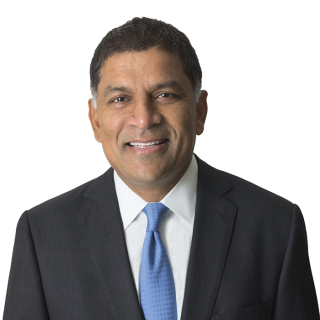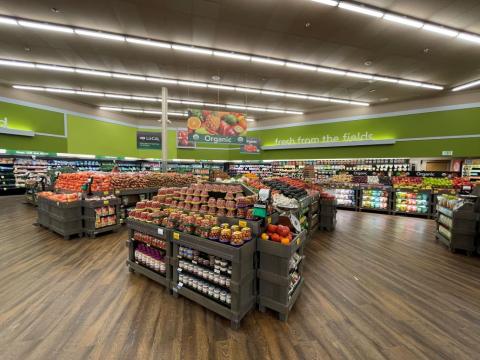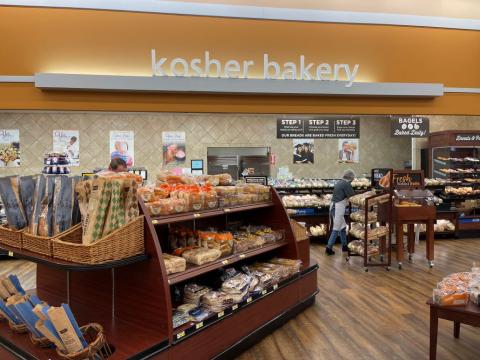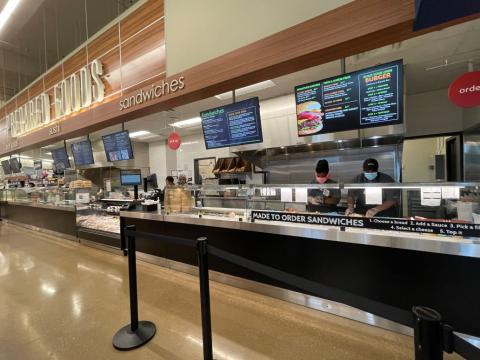Inside the Reinvention of Albertsons Cos.

When the Albertsons Cos. revealed in February that it had launched a strategic review of its business, grocery industry watchers wondered what would come next for the Boise, Idaho-based company.
What comes next, according to Albertsons CEO Vivek Sankaran, is a reimagination of how the grocer connects with, and earns the trust of, shoppers.
What also comes next, no matter the outcome of the formal effort to identify value-creating opportunities within Albertsons, is a new phase of the company’s evolution predicated on the belief that satisfied customers create outsized lifetime value and should become “Customers for Life.”
“Moving forward, our goal is to earn that deep trust with every customer who engages with us,” Sankaran asserts in an exclusive interview with Progressive Grocer. “We will do that, as we’ve always done, by connecting with customers in our stores, and by engaging with them digitally through technology and content that complements the store experience.”
The operator of 2,278 stores in the United States is embarking on a five-pronged strategy designed to place the customer at the center of everything that it does, with the ultimate goal of supporting customers every day, every week and for a lifetime.

This multifaceted strategy includes:
- Digitally connecting and engaging customers through the mobile app and website so that they can enjoy curated experiences in e-commerce, the community, loyalty, health and media
- Differentiating the store experience by deepening engagement using technology, and removing associate pain points to allow employees to focus on customer service versus just tasks
- Elevating the retailer’s distinctiveness in fresh by expanding private-brand products and services, and enhancing product offerings in center store to address customers’ changing needs and preferences
- Modernizing capabilities through an improved supply chain, enhanced data and data analytics, and ongoing productivity, all built on the foundation of being locally great and nationally strong
- Further embedding environmental, social and governance (ESG) throughout operations
“We want our customers to interact with us daily, not only to shop, but sometimes to simply consume relevant content about food or planned meals, or find information to inspire their well-being,” Sankaran says. “Our business model is pivoting to one that is loyalty-based, doubling down on our omnichannel engagement with customers beyond just transactions. We will elevate the in-store experience when they shop with us, expand our services and content-rich offerings, and build a set of competitive and timeless capabilities that create a compelling reason for our customers to seek a lifetime relationship with our team members and our banners.”
The company is in a great position to leverage a loyalty strategy in a grocery environment that’s extremely difficult amid historic inflation, product shortages and other challenges. Shoppers are looking for grocery retailers to offer personalized approaches focused on value, and will stick to those that do.
“We believe in an omnichannel experience that provides customers a great, personalized shopping experience, no matter how they interact with us,” Sankaran notes. “In fact, we’ve found that omnichannel households spend three times more with us than in-store-only shoppers.”

Pandemic Purpose
In April, Albertsons Cos. reported impressive fourth-quarter same-store sales: an increase of 7.5% year over year, and a 19.3% boost on a two-year stack. Digital sales grew 5%, but on a two-year stacked basis, growth was 287%. Net sales and other revenue at Albertsons were $17.4 billion during the quarter ended Feb. 26, compared with $15.8 billion during the year-ago period. According to the company, the increase was attributable to its 7.5% increase in comps and higher fuel sales, with retail price inflation contributing to the identical-sales increase.
For fiscal 2021, comps dipped 0.1%, while on a two-year stacked basis, same-store sales growth was 16.8%.
Sankaran attributes the grocer’s better-than-expected earnings results in the fourth quarter to the benefits from the company’s digital and omnichannel investments, as well as a rebound in in-store traffic.
In fiscal 2021, capital expenditures at Albertsons were $1,606.5 million, including investments in 10 new store openings, remodels of existing locations, and technology.
“We continue to invest in and modernize our stores, including adding and upgrading self-checkout, which is now available in over 1,800 stores, and optimizing the layout and design to improve the customer shopping experience and highlight our fresh and local offerings,” Sankaran says.
The company expects a same-store sales bump of 2% to 3% in fiscal 2022, adjusted EBITDA in the range of $4.15 billion to $4.25 billion, adjusted net income per share in the range of $2.70 to $2.85 per share, and capital expenditures in the range of $2 billion to $2.1 billion. Part of the reason for the success at Albertsons, which went public in 2020, has been the pandemic, which Sankaran says helped the company “live its purpose.”

“We were there when people needed food to cook for their families while staying at home; we were there when they needed a safe store to shop, or groceries delivered; and we were there when they needed prescriptions and vaccinations,” he explains. “At the same time, we were able to demonstrate our deep commitment to taking care of our associates and our communities.”
Major operational initiatives for 2022 and beyond include productivity-focused targets such as consolidating indirect spend and expanding national buying initiatives, which have already begun to generate significant savings, according to Sankaran.
“Productivity has become part of how we run the business, and we’ll continue to challenge ourselves to find new ways to work more efficiently,” he says. “One of the things I’m most excited about are the steps we’re taking to make our operations more sustainable. For example, we are reducing the electricity usage in our stores and other facilities by investing in things like energy-efficient LED lighting, energy management systems to monitor our energy consumption, and solar energy.”
According to Albertsons, it’s expected to reach its target of $1.5 billion in productivity savings by the end of fiscal 2022.
“We have already identified $750 million in future savings that we are committing to between fiscal 2023 and fiscal 2025 in the areas of automation and digital tools, scalable workforce management, modernization of our supply chain, and SG&A optimization,” Albertsons CFO Sharon McCollam said during the company’s fourth-quarter earnings call.
In his PG interview, Sankaran also discusses areas of opportunity when it comes to supply chain optimization.
“We have an amazing supply chain team, and they have done great work over the last two years in a challenging external environment,” he pointed out. “Modernizing our supply chain is one of our priorities, and we are introducing automation to a number of our distribution centers to eliminate tough and tedious tasks and speed up operations.”

‘Locally Great, Nationally Strong’
When it comes to going to market differently in each location — the company has more than 20 banners — and across several platforms, the Albertsons philosophy remains “Locally Great. Nationally Strong.”
“We strive to retain the rich history of each banner and what makes that banner a special part of the local community,” Sankaran affirms. “At the same time, we want all our stores to benefit from our national programs and technologies like the Albertsons for U app, FreshPass, and our DriveUp & Go curbside pickup program.”
Over the past several years, Albertsons has been expanding the range of digital services that it offers customers. Last year, it launched a new Albertsons for U shopper loyalty program. Membership is free, and new members immediately earn $5 off their next in-store or online purchase of $25 or more of qualifying items. After that, members earn points on nearly every dollar spent, and points can be redeemed on groceries and gas. Perks include personalized deals, a free item every month and a birthday treat.
FreshPass, an optional subscription service, offers unlimited free delivery on orders of $30 or more, and, in select markets, free two-hour grocery delivery and curbside pickup. Subscribers also receive rewards that don’t expire and exclusive culinary and wine experiences.
Additionally, Albertsons has a partnership with the Fetch Rewards consumer loyalty and shopper rewards app to send its users personalized offers; the grocer maintains delivery partnerships with DoorDash and Uber as well.
Last year, Albertsons rolled out a 1,200-store grocery delivery partnership with San Francisco-based Uber after Albertsons said that it would move away from offering its own grocery delivery service. Albertsons also has a partnership with DoorDash, also based in San Francisco, to offer on-demand grocery delivery from nearly 2,000 Albertsons stores.
In May, Albertsons and Uber expanded their partnership to include more than 2,000 of the grocer’s banner stores nationwide, among them Albertsons, Safeway, Jewel-Osco, Acme, Tom Thumb and Randalls. The expansion makes Uber Eats available at nearly 800 new Albertsons banners for the first time ever in such states as Connecticut, Indiana, New Hampshire, Utah, Vermont and Rhode Island.
“We are continuing to explore new and innovative ways to provide customers a delivery experience that fits their lifestyle,” Sankaran says. “For example, earlier this year, we introduced express grocery delivery through our partnership with DoorDash, offering customers faster and more convenient delivery of fresh groceries in under 30 minutes. We recently announced customers can now get groceries from more than 2,000 of our stores through the Uber Eats app.”
Sankaran notes that an important part of the grocer’s five-pronged Customers for Life strategy is digitally connecting and engaging with customers so that they can enjoy integrated and curated experiences. Albertsons is hoping that its growing retail media network will help underpin that effort and drive sales.
“Just about every important capability in our company is now data and technology-enabled, whether it’s the promotion engine, ordering, production, automation in distribution centers, etc. We’re using data and technology to better understand our customers and deliver a more personalized shopping experience,” he observes. “Another thing we’re excited about in this space is the new Meal Planning Tool in our app, which includes thousands of recipes developed by professional chefs and dietitians. Customers can search these recipes based on taste or a dietary preference like vegetarian or gluten-free. Once they choose a recipe, they just click to add all the ingredients to their shopping list, or can immediately purchase the ingredients in the app.”
Yet, even with so much food shopping shifting online, Sankaran says, stores remain “the foundation of our business, and that’s not changing.”
He adds: “Having clean, well-stocked stores in great locations near where people live is what allows us to provide great service and a tailored assortment to local customers, no matter how they shop with us — in-store or online. First, we offer a great fresh assortment. You can get just about anything you need to cook a fresh meal from our store. For customers who want additional convenience, we launched our ReadyMeals program, which offers a variety of freshly made meals that are ready to eat now or can be quickly heated or cooked at home.”

A Recipe for Change
Albertsons completed more than 230 remodels and opened 10 new stores in fiscal 2021, and the company is planning to expand its fresh offering as part of the next phase of its transformation strategy.
“Our differentiation is anchored in fresh — produce, bakery, meat, seafood, deli and floral — and we continue to extend our fresh offering,” Sankaran says. “For example, our expanding ReadyMeals program gives consumers fresh and convenience at the same time.”
According to Sankaran, the company believes that customers should be able to complete all of their shopping when they visit an Albertsons store, and not have to make additional trips to competitors.
“It’s important that our assortment is broad, especially in the center store,” he emphasizes. “We also think it’s important to tailor our assortment locally — for example, we have an extensive kosher assortment in select Chicago stores, and a variety of local seafood in our New England stores.”
In fiscal 2021, Albertsons added 837 new products into its Own Brands lineup, including ready-to-eat meals, refrigerated Signature Reserve pastas, Open Nature broccoli pizza and Open Nature plant-based shredded cheese.
“During the year, we saw particularly strong private label performance in our floral, deli and meat departments,” Sankaran says. “We’re extremely proud of our Own Brands portfolio, which offers our customers more than 12,000 exclusive products under brands like Signature Select, O Organics, Lucerne and Open Nature. Own Brands is a strategic growth pillar for us, and we’re constantly looking at ways to expand the offering across the store with purposeful brands, inspiring products and exceptional value.”
At the same time, Albertsons is aiming to leverage its national presence and expertise to drive proactive change for communities and the planet.
The grocer’s recently introduced Recipe for Change ESG framework lays out long-term goals for sustainability, including fighting climate change by reducing carbon emissions through science-based targets, eliminating food waste going to landfills, reducing the use of plastic, and accelerating its transition to a more circular economy.
Sankaran offers a few examples of how Albertsons is integrating sustainability into day-to-day operations.
“Our entire private truck fleet is certified by the EPA’s SmartWay program as we work to reduce our carbon footprint,” he says, “and earlier this year, we announced we are using an AI-powered platform to better manage our inventory and fresh product supply. This helps reduce food waste, lower greenhouse-gas emissions and save water while making sure our customers have access to the freshest products when shopping with us.”
Another part of the grocer’s Recipe for Change is making the company a better place to work and overcoming the sustained labor crunch.
“The most important part of my job is supporting and empowering our front-line associates,” Sankaran notes. “One thing we’re focused on right now is how we can make it easier for our store associates to serve our customers. For example, we’re looking at what the small things, or ‘pain points,’ are that create unnecessary work for our front-line associates each day and how we can remove those things. Simplifying the way work gets done will allow our associates to focus on what they do best, which is interacting with the customer.”
He adds that Albertsons associates completed more than 6 million hours of training through various programs, including on-the-job training, mentoring programs, e-learning and classroom-style events, in 2020.
“One training program we’re particularly proud of is our Leading with Inclusion workshops,” Sankaran says. “More than 10,000 leaders have participated in these interactive sessions designed to heighten awareness around bias and provide tools to support associates’ ability to create a more inclusive work environment.”
As the grocery world waits for the outcome of the company’s strategic review, the grocer is clearly investing in its workforce and in technology to transform itself for a future rife with disruption and competition. Sankaran is confident that the company is up to the challenge.
“Being a leader means we have a responsibility to continue to provide the highest level of service to our customers and communities,” he says. “We will continue to earn our leadership position by placing the customer at the center of everything that we do by serving, supporting and caring for them every day, every week and for a lifetime.”





